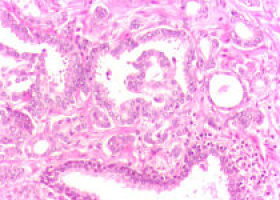
A Phase III multicenter clinical trial finds that treatment with the investigational BRAF-targeted drug dabrafenib reduced the risk of disease progression by 70 percent compared to standard dacarbazine chemotherapy in patients with previously untreated, advanced melanoma with mutations in the BRAF gene.
The investigators also noted that there appeared to be fewer cases of serious skin toxicities associated with dabrafenib treatment, including squamous cell carcinomas, than have been previously reported in other trials evaluating the current standard targeted drug for these patients, vemurafenib.
"For three decades, we had no new therapies for metastatic melanoma, but we’re quickly gaining momentum. Last year, ipilimumab and vemurafenib were approved, and now dabrafenib could be on the horizon," explained lead author and global principal investigator Axel Hauschild, MD, Professor of Dermatology at the University Hospital in Kiel, Germany.
"These findings represent another advance for melanoma and form the foundation for further studies to evaluate the role of dabrafenib in combination with other drugs.”
Like vemurafenib, dabrafenib is taken orally and works by inhibiting BRAF, an altered protein that drives the growth of metastatic melanoma.
Previous studies have suggested that patients taking vemurafenib have an increased risk of sun sensitivity and secondary, less serious skin tumours (such as squamous cell cancers); these occurred in 12 percent and 12 percent of patients, respectively, in a Phase III trial.
However, patients taking dabrafenib in this study reported a low incidence of such serious skin side effects: 3 percent had photosensitivity and 6 percent developed squamous cell carcinomas.
In this study, called BREAK-3, patients with previously untreated, inoperable stage III or IV melanoma were randomly assigned to receive dabrafenib (187 patients) or standard chemotherapy, dacarbazine (63 patients). Fifty percent of patients in the dabrafenib group responded to therapy, compared with 6 percent of patients treated with dacarbazine (independent reviewer confirmed figures).
Estimated median progression-free survival was significantly longer in the dabrafenib group: 5.1 months versus 2.7 months. Overall survival data are not yet mature, but may be difficult to assess since patients whose disease progressed on dacarbazine were permitted to cross over to the dabrafenib study arm. Both treatments were generally well-tolerated.
More patients in the dacarbazine group experienced drops on their blood cell counts, while more patients in the dabrafenib group experienced mild to moderate skin reactions, joint pain and fever.
Source: ASCO
We are an independent charity and are not backed by a large company or society. We raise every penny ourselves to improve the standards of cancer care through education. You can help us continue our work to address inequalities in cancer care by making a donation.
Any donation, however small, contributes directly towards the costs of creating and sharing free oncology education.
Together we can get better outcomes for patients by tackling global inequalities in access to the results of cancer research.
Thank you for your support.